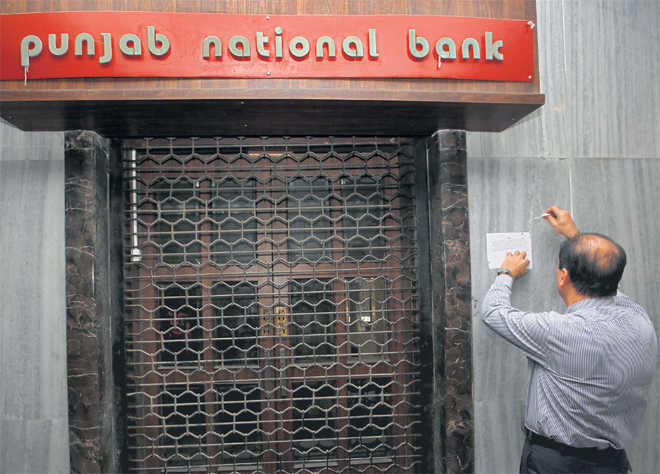
The Punjab National Bank branch after it was sealed by the police in Mumbai on February 19. REUTERS
Anmol Rattan Narang
Former bank staffer and retired principal, staff training college of a nationalised bank
Much has been written about the Rs11,300-crore fraud in one of the most prestigious nationalised banks, the Punjab National Bank. But only a banker knows the nitty-gritty of banking. Writers from other fields are not in a position to pinpoint as to where the mistakes occurred. That this why they have mostly pointed at system failures.
First of all, congratulations to the PNB authorities for getting a deputy manager (a middle management officer) and an SWO (a clerk) arrested. Kudos to them for taking timely action. It's a wonder why they did not get the peons, the armed guard and the sweeper/sweepress arrested! This would have helped the bank recover the amount fast!
Now, let’s seriously look into the systems.
Renewal of limits: As per RBI instructions, all limits (whether fund-based or non-fund based limits) have to be renewed every year. The fraudulent limit of Rs 11,300 crore of Nirav Modi is going on since 2011. Was this limit never renewed? Bankers, while renewing limits, take into account the following points:
- Whether financial discipline was adhered to by the client during the last year.
- Whether the limits had been breached, and if so, how many times?
- Audited financial statements are called for and thoroughly analysed to see whether the current ratio has improved or deteriorated and whether debt-equity ratio is within the benchmark limits.
Some skeptics argue that since this is a non-fund based limit, what does it have to do with current ratio and debt-equity ratio? But, even in non-fund based limits, all these points are taken into account since non-fund based limits are contingent liabilities, which may arise at any time. These accounts are also rated by the banks every year. And while rating, non-fund based limits are given 50 per cent weightage. Securities are also taken into account.
Above all, the limits of the high magnitude of Rs 10,000 crore are sanctioned by the bank's board which comprises a chartered account, an RBI nominee and a Government of India nominee, among others. What did these people do while sanctioning/renewing the limit?
Because the non-fund based limit had been going on since 2011, the following questions arise:
- Who sanctioned the limit?
- Was it being renewed/reviewed? If not, why unauthorised transactions were allowed? Who allowed them?
- Were the accounts rated?
- Who were the auditors? Such big customers' accounts are personally checked by the statutory auditors. Didn't anybody detect what was going on?
- Was there no whistleblower in the bank?
- There are risk management departments in every bank, headed by a general manager, assisted by a DGM, an AGM and a number of chief managers. What were they doing?
- There is a risk management committee in every bank, which is expected to meet at least once a month. Was no such meeting held or could the committee not fathom the wrongdoing?
- The deputy manager, who is said to be the kingpin of the fraud, was on the same seat for the last seven-eight years. Was he so indispensable that he was never transferred or his duties rotated?
- What was the Chief Vigilance Officer of the bank doing? Is it not his job to see whether the others are committing any mistakes? Is it not his duty to see that people in sensitive posts are not retained in the same seat, city or place beyond a reasonable time?
- What were the bank union leaders doing? They do not miss any chance to protest when policy guidelines are not followed by the management. Why did they remain silent when an officer remained on one seat for over seven years? Did they have a share in the pie?
- Was the NOSTRO account of the bank reconciled? If so, didn't anybody see from where such big entries were emanating?
- Was nobody auditing SWIFT messages? Was everything left to the deputy manager and the SWO?
The questions are many. Opposition parties are demanding a joint parliamentary committee on the PNB fraud. If such a committee is formed, some bankers must also be included in it so that truth can be brought to surface and loopholes plugged for such recurrences.



























